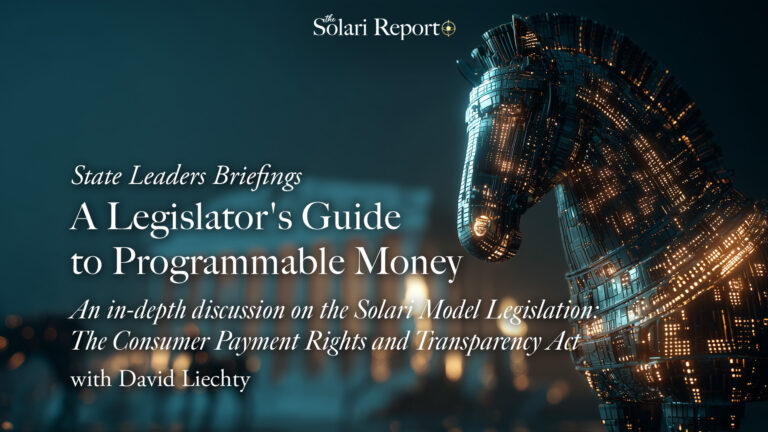In light of recent events, I am republishing.]
By Catherine Austin Fitts
In the fall of 2001 I attended a private investment conference in London to give a paper, The Myth of the Rule of Law or How the Money Works: The Destruction of Hamilton Securities Group.
The presentation documented my experience with a Washington-Wall Street partnership that had:
- Engineered a fraudulent housing and debt bubble;
- Illegally shifted vast amounts of capital out of the U.S.;
- Used “privitization” as a form of piracy – a pretext to move government assets to private investors at below-market prices and then shift private liabilities back to government at no cost to the private liability holder.
Other presenters at the conference included distinguished reporters covering privatization in Eastern Europe and Russia. As the portraits of British ancestors stared down upon us, we listened to story after story of global privatization throughout the 1990s in the Americas, Europe, and Asia.
Slowly, as the pieces fit together, we shared a horrifying epiphany: the banks, corporations and investors acting in each global region were the exact same players. They were a relatively small group that reappeared again and again in Russia, Eastern Europe, and Asia accompanied by the same well-known accounting firms and law firms.
Clearly, there was a global financial coup d’etat underway.
The magnitude of what was happening was overwhelming. In the 1990’s, millions of people in Russia had woken up to find their bank accounts and pension funds simply gone – eradicated by a falling currency or stolen by mobsters who laundered money back into big New York Fed member banks for reinvestment to fuel the debt bubble.
Reports of politicians, government officials, academics, and intelligence agencies facilitating the racketeering and theft were compelling. One lawyer in Russia, living without electricity and growing food to prevent starvation, was quoted as saying, “We are being de-modernized.”
Several years earlier, I listened to three peasant women describe the War on Drugs in their respective countries: Colombia, Peru, and Bolivia. I asked them, “After they sweep you into camps, who gets your land and at what price?” My question opened a magic door. They poured out how the real economics worked on the War on Drugs, including the stealing of land and government contracts to build housing for the people who are displaced.
At one point, suspicious of my understanding of how this game worked, one of the women said, “You say you have never been to our countries, yet you understand exactly how the money works. How is this so?” I replied that I had served as Assistant Secretary of Housing at the US Department of Housing and Urban Development (HUD) in the United States where I oversaw billions of government investment in US communities. Apparently, it worked the same way in their countries as it worked in mine.
I later found out that the government contractor leading the War on Drugs strategy for U.S. aid to Peru, Colombia and Bolivia was the same contractor in charge of knowledge management for HUD enforcement. This Washington-Wall Street game was a global game. The peasant women of Latin America were up against the same financial pirates and business model as the people in South Central Los Angeles, West Philadelphia, Baltimore and the South Bronx.
Later, courageous reporting by several independent investigative reporters confirmed in detail that the privatization and economic warfare model I discussed in London had deep roots in Latin America.
We were experiencing a global “heist”: capital was being sucked out of country after country. The presentation I gave in London revealed a piece of the puzzle that was difficult for the audience to fathom. This was not simply happening in the emerging markets. It was happening in America, too.
I described a meeting that had occurred in April 1997, more than four years before that day in London. I had given a presentation to a distinguished group of U.S. pension fund leaders on the extraordinary opportunity to re-engineer the U.S. federal budget. I presented our estimate that the prior year’s federal investment in the Philadelphia, Pennsylvania area had a negative return on investment.
We presented that it was possible to finance places with private equity and re-engineer the government investment to a positive return and, as a result, generate significant capital gains. Hence, it was possible to use U.S. pension funds to significantly increase retirees’ retirement security by successfully investing in American communities, small business and farms — all in a manner that would reduce debt, improve skills, and create jobs.
The response from the pension fund investors to this analysis was quite positive until the President of the CalPERS pension fund — the largest in the country — said, “You don’t understand. It’s too late. They have given up on the country. They are moving all the money out in the fall [of 1997]. They are moving it to Asia.”
Sure enough, that fall, significant amounts of moneys started leaving the US, including illegally. Over $4 trillion went missing from the US government. No one seemed to notice. Misled into thinking we were in a boom economy by a fraudulent debt bubble engineered with force and intention from the highest levels of the financial system, Americans were engaging in an orgy of consumption that was liquidating the real financial equity we needed urgently to reposition ourselves for the times ahead.
The mood that afternoon in London was quite sober. The question hung in the air, unspoken: once the bubble was over, was the time coming when we, too, would be “de-modernized?”
In 2009 — more than seven years later — this is a question that many of us are asking ourselves.
Part II: Rethinking Diversification
Related Reading:
Dillon, Read & Co. Inc. and the Aristocracy of Stock Profits





















































































































If you want to get a good visual insight to these people google The Fabian Window, with its wolf in sheep clothing sheild and the picture of the planet being hammered into a new shape and the slogan Pray devoutly and hammer stoutly it says it all.
Sometimes reality makes more sense if you reverse it.
Here is an example. Time goes past to future, right? How obvious is that! The very history of humanity is bound up in it.
Consider; If two atoms strike each other, they create an event. While these atoms go from past events to future ones, the event goes the other way. First it is in the future and then in the past.
So which is the real direction? Do we travel along this fourth dimension from the past into the future, or is time simply a consequence of motion, similar to temperature and each event is replaced by the next and fades into the past? Are we traveling this fourth dimension from yesterday to tomorrow, or does tomorrow become yesterday because the earth rotates?
If time is simply a measure of motion, it would be meaningless to ascribe a dimensionless point to it, as that would be a cessation of motion, like a temperature of absolute zero. Temperature is an average of motion. Time is a unit of motion and fuzzy at that, since delineation can’t be instantaneous.
Now consider monotheism, the all-knowing absolute, as Pope John Paul II described it. This is a contradiction, as the absolute, the universal state, is neutral, lacking any definition or distinction, while knowledge is a feedback loop of distinction and judgement. The universal perspective monotheism implies is an oxymoron. It is subjectivity which creates perspective in the first place. Think in terms of one frame of film being re-exposed many times over. Quickly any and all details of any particular exposure are lost. The absolute is that blank slate. So a spiritual absolute wouldn’t be a intellectual or moral ideal from which we fell, but the raw essence of consciousness from which we rise. So any potential God, ie, universal perspective, could only be the raw awareness of which we as individuals, give personality. It doesn’t matter if you are an atheist or theist, since understanding consciousness is like staring into the abyss. There is no way to fathom how far down it goes, whether there is some material connection from which it originally formed, or whether it is actually the material reality which fades away first, or whether they both fade together. It should be noted that physics has spent millennia trying to comprehend the material basis of reality and only finds sub-levels of activity and connectivity. It’s more network than nodes. So the dynamic is upward and any top down structure, institution, complex being, etc. is just providing form until it too breaks down and is consumed.
These elites are simply the emergent top predators in a complex eco-system and top predators are especially vulnerable to a collapse of that eco-system.
The next step is from top predator in the collapsing planetary eco-system, to central nervous system of the emerging planetary organism. This will require a fundamental reassessment of many of our basic assumptions. One is to understand and accept the necessity of death as a function of life. You can’t have tomorrow until today is past. Life is a process of creation and consumption, as it bootstraps itself upward. Adults are the shell that forms as life hardens to protect the next generation and must be shed for the next generation to expand and have its day. It is that elemental being that shines through us all, Rich and poor. Top and bottom. The elites have developed ways to perpetuate themselves, but when they reach the point of being more burden than guide, they too get shed like an old shell.
Going back to the point about time, we as distinct individuals and the details of our lives fade away into the past, in order to push the essential consciousness forward and upward into the future.
Good and bad are not a dual between the forces of light and darkness, but are the binary code of biological calculation. Even the most basic life forms distinguish between beneficial and detrimental. Between light and dark are not just shades of grey, but all the colors of the spectrum.
P.S. For those advocating returning to a gold standard, read up on William Jennings Byron and his Cross of Gold speech. The problem with a gold standard, or any commodity based currency, is the “Golden Rule.” Those with the gold, rule. That’s the real advantage of a tax based currency. It really does work best when it’s understood to be the property of the taxpayers, just like a public road system.
Interesting that I read through all sixty-some comments without seeing one reference to psychopaths, those who inhabit human bodies but lack any form of conscience. Figured I had better remedy that lack. Those who don’t understand the concept of psychopaths (no, not psychotics) would do well to do a web search for the word “ponerology”. It will all start to make sense.
To Snowman:
In answer to your question re. Hitler, read THE ANGLO-AMERICAN ESTABLISHMENT by Carroll Quigley. Hitler was, at least in part, pushed forward towards his conflict with Russia by the elite British Milner group and by powerful pro-Nazi elements of the British aristocracy.
They cleared the way at every step in his consolidation of power.
I’ve always been intrigued by the statement in Albert Speer’s biography that one day he saw Hitler emerge from behind the closed doors of his bedroom, white-faced, repeating distractedly to himself that his “voice had gone silent”. Then he he saw Speer, and abruptly changed the subject. Immediately following that incident he suffered his first catastrophic defeat in a massive tank battle in Russia, and the tide of war swung irreversibly against him. What “voice had gone silent”?
Was Hitler instructed and led by radio step by step, until his scornful generals came to deem him a military genius who seemed to never get it wrong? Until, that is, he was “instructed” to turn away from Moscow and set up for defeat before his radioed guidance went unexpectedly silent…?
http://markinthepark.net/blog/?p=96
Ignotas Nulla Curatio Morbid – A Review of Political Ponerology by Andrzej M. Lobaczewski
Ignotas nulla curatio morbid – do not attempt to cure what you do not understand – is the opening theme in this study of evil. Political Ponerology is “a science on the nature of of evil adjusted for political purposes.” The author, Andrzej Lobaczewski, describes himself as a Polish psychologist who — with many other colleagues — found meaning living through Nazism and then Communism by studying how evil happens and triumphs in a wider political and economic system.
Lobaczewski’s hypothesis is that a small percentage of humans are born psychopaths. He describes the research to back up that data that was destroyed and supressed. Another minority percentage are of a nature to go along with psychopaths while the vast majority of people are essentially healthy. The majority who are healthy have a difficult time understanding that some people are not — they can not fathom being a psychopath or acting like one.
No one has worked harder in the last five years to understand the Tapeworm than Harry Blazer. It was Harry who discovered Political Ponerology and sent it to me. I found it chock full of deeply useful insights that can inform organizing to shift our situation. For example, Lobaczewski discovered that dealing with psychopathic systems made healthy people neurotic. However, they could heal very quickly when he gave them a scientific framework for understanding what had happened and why. With a sound framework, they could start to differentiate who was healthy and who was not and to devise strategies to deal effectively with psychopaths in power. Rather than having their relations with all humans destroyed, they were able to discriminate between healthy and unhealthy and increase their immunity to the drain of unhealthy culture and systems.
I strongly recommend this book for anyone who is managing human or financial risk in this environment or is looking to create healthy change. Traditionally, the Tapeworm’s greatest advantage is that healthy people can not fathom what they are up against and so keep inviting the Tapeworm back into their intimate spaces. This book helps you understand why that will not work. It helps you understand why conspiracies of the healthy and ‘coming clean’ are essential.
Political Ponerology is a book to read slowly. Lobaczewski uses a lot of academic and long words. The insights are deep and rich — they require focus and concentration. And the point comes home again and again:Â Ignotas nulla curatio morbid — do not attempt to cure what you do not understand.
Political Ponerology is available from:
Red Pill Press
http://www.redpillpress.com/
I-feel-“de-moderized”-already!
But,I-LOVE-eating-grubs-and-earthworms,great-protein!
Don’t-you-even-THINK-’bout-takin’-my-worms,man,I-gots
me-a-shotgun,don’t-cha-know.
Very interesting analysis connecting the dots.. FDR once said “Nothing in politics ever happens by accident.”
As big/global as this problem is, the only people that continue to profit from the taxpayer bailouts are some but not all of the financials. The taxpayers are being herded into bigger government programs by ever growing debt.
Just as I upheld my Constitutional oath in Iraq, I am prepared to uphold it here at home. We loose this fight her, we have nowhere else to go. Let’s rock-n-roll!